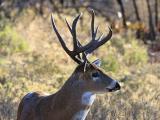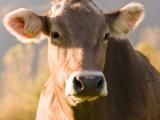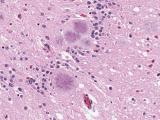May 20, 2003 (CIDRAP News) – Postmortem tests have confirmed that a cow from an Alberta farm had bovine spongiform encephalopathy (BSE), or mad cow disease, Canadian officials announced today. The news marked the first known BSE case in North America since another Alberta case was found in 1993.
The US Department of Agriculture (USDA) immediately announced a temporary ban on imports of Canadian cattle, beef, and beef products. "USDA is placing Canada under its BSE restriction guidelines and will not accept any ruminants or ruminant product from Canada pending further investigation," Agriculture Secretary Ann Veneman stated.
The case was detected through Canada's regular BSE surveillance program, Alberta and Canadian federal officials said in a news release. "Alberta agriculture officials tested a cow that had been condemned at slaughter and removed from the food system," officials said. The carcass was sent to a rendering plant.
An Alberta laboratory and the Canadian Food Inspection Agency (CFIA) tested brain tissue from the 8-year-old cow May 16 and 18, respectively, and found possible signs of BSE, Canadian officials said. "The CFIA sent specimens to the World Reference Laboratory at Weybridge, United Kingdom, which has verified the presence of BSE," the statement said. The cow came from a northern Alberta ranch and was slaughtered Jan 31 because of suspected pneumonia, the Associated Press reported.
"The CFIA and the Province of Alberta are investigating the animal's origin and how its remains were processed," Canadian officials said in their news release. "Information suggests that the risk to human health and the possibility of transmission to other Canadian cattle from this case are extremely low."
The Alberta farm has been quarantined and the 150-head herd from which the cow came will be destroyed after necessary testing is completed, the statement said. "Any additional herds that are found to be at risk as a result of the investigation will also be depopulated," officials said.
Veneman said the USDA is sending a technical team to Canada to help in the investigation. "Information suggests that risk to human health and the possibility of transmission to animals in the United States is very low," she said.
No BSE case has ever been identified in the United States. The previous BSE case in Alberta was found in 1993 in a cow imported from Britain, according to AP and Canadian Press reports. The herd was destroyed and no further cases were identified.
A BSE outbreak occurred in British cattle herds starting in 1986, apparently because cattle were fed with fodder that contained protein from infected animals. Eating beef from BSE-infected cattle is believed to be the cause of variant Creutzfeldt-Jakob disease (vCJD), a fatal brain disease in humans. A number of vCJD cases were diagnosed in the Britain in the 1990s.
The United States in 1989 banned the importation of cattle, sheep, and goats and most related products from countries that have BSE or are considered to be at risk for BSE. And in 1997 the US banned the use of most mammalian protein in feed intended for cows and other grazing animals.
In a Canadian Press report, Debbie Barr, a CFIA veterinarian, said that tracing the infected cow's history is crucial. She said the cow had been on the Alberta farm the past 3 years, but its whereabouts before that were not yet known.
If the cow was born and raised in Canada and was not fed any imported feed, that could suggest a problem with contaminated feed in Canada, said Wayne Martin, an epidemiologist at the Ontario Veterinary College in Guelph, Ont. Martin was quoted in the Canadian Press report.
See also:
Alberta government news release
http://www.gov.ab.ca/acn/200305/14425.html
Agriculture Secretary Ann Veneman's statement
http://www.usda.gov/documents/NewsReleases/2003/05/0166.doc
















